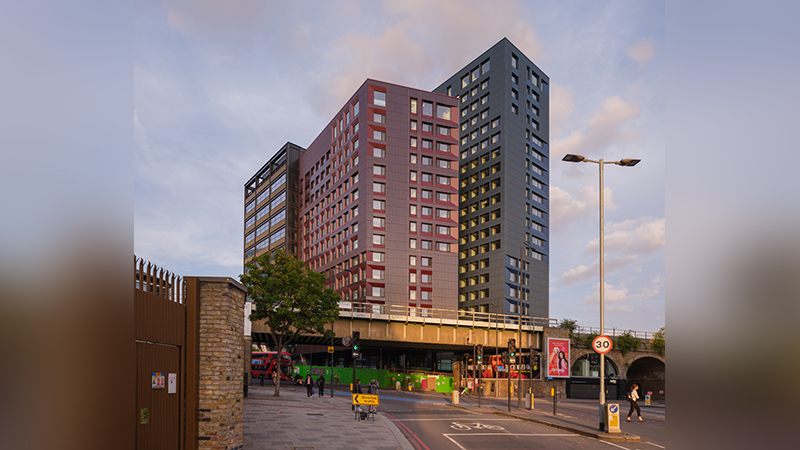Legislation to reform the leasehold system will be pushed through by the government before the general election.
Delivering the King’s Speech at the state opening of parliament, King Charles announced that the government will attempt to put the Leasehold and Freehold Bill on the statute book over the next few months.
The King, delivering the first King’s Speech, as opposed to a Queen’s Speech, in more than 70 years, said: “My ministers will bring forward a bill to reform the housing market by making it cheaper and easier for leaseholders to purchase their freehold and tackling the exploitation of millions of homeowners through punitive service charges.”
He also added that the Renters Reform Bill would be carried over into the new parliamentary term.
“Renters will benefit from stronger security of tenure and better value, while landlords will benefit from reforms to provide certainty that they can regain their properties when needed,” he told peers and MPs.
In his introduction to the supporting documents to the speech, prime minister Rishi Sunak added: “We’re announcing new laws to reform the housing market with a Leasehold and Freehold Bill – making it easier for leaseholders to extend their lease or purchase their freehold, and tackling the exploitation of millions of homeowners through punitive service charges.”
The leasehold bill will increase the standard lease extension term from 90 years to 990 years for both houses and flats, with ground rents reduced to zero. The requirement for a leaseholder to have owned the property for two years before applying will also be removed.
The BPF’s Ian Fletcher said the legislation was “a Bill of missed opportunity and stored up problems”.
“It wants to improve the experience of leaseholders yet says nothing about their main day-to-day interaction with managing agents, who are unregulated,” he said. “It wants to scrap ground rents, yet says nothing about the disruption that will cause to everyday management, and building remediation efforts, as freeholders’ businesses become unviable. Silence kicks commonhold into the long-grass, perhaps for ever. And by raising the enfranchisement threshold on mixed-use property, it damages the mixed-use property investment market, as more landlords lose their development rights, and control of their property’s management, hurting levelling-up in the process.”
He concluded: “It is a patchwork, and some way from the comprehensive reform suggested by the Law Commission.”
Caroline Wild, senior associate at Forsters, said: “The introduction of a cap on all existing ground rents to a peppercorn would be a radical departure from the government’s February 2021 proposal to cap ground rents at no more than 0.1% of freehold value.
“Given the difficult political arena and the need to find a balance between the competing interests of leaseholders and landlords, it is difficult to see this going through without a strong challenge, and certainly not without further consultation.”
She pointed out that a number of funds, including pension funds, own large ground rent portfolios and “this value cannot simply be wiped out”.
The BPF’s Fletcher agreed. “Though they may not know it, the Bill will wipe billions of pounds off the savings of not just investors, but charities, pensioners, and local authorities,” he said.
Other aspects of the bill will increase the 25% non-residential limit to 50%, meaning the law will apply to any building that is at least half residential by floorspace.
New leasehold houses will also be banned, but not new leasehold flats.
Scott Cabot, head of residential research at CBRE said that this was a “positive for home-owners and could serve to boost overall liquidity of the housing market. However, with an estimated 70% of leaseholders living in flats, consideration needs to be given to extending the reform to include new flats, as well as houses.”
Jeremy Raj, head of residential property at Irwin Mitchell, said: “It’s difficult to imagine that anything of significance will be achieved following today’s announcement, other than further irritating certain MPs with unrealistic expectations, along with all the vested interest groups within the residential property sector.
“None of today’s proposals deal with the fundamental issues troubling the housing market, such as lack of supply, uncertainty regarding future regulation, unsuitable stock for our environmental ambitions and our population profile and, of course, the affordability crisis,” he added.
Lauren Fraser, senior associate at Charles Russell Speechlys, said: “Given the focus on reforms to leasehold in the lead up to the King’s Speech, the lack of detail we have seen today regarding the plans is surprising. These commitments were announced four years ago by the government, now simply being repackaged as new plans.”
Meanwhile the Renters (Reform) Bill will ban no-fault evictions. Sunak said: “Our Renters Bill will ensure a fairer deal for renters and landlords, by outlawing no-fault evictions and enabling landlords to evict anti-social tenants faster.”
The King hinted at further legislation to impact the built environment: “My government will deliver a long-term plan to regenerate towns and put local people in control of their future.”
But Henry Moss, partner at law firm Ashurst said: “It feels like the government are trying to look like they are taking action while actually kicking the can. No fault evictions will stay in place until new court processes are in place, and there is no deadline for upgrading homes with poor energy efficiency. This just increases uncertainty for investors as to when and how rules will apply.”
Indeed, supporting documents for the speech have confirmed that domestic EPC targets will be scrapped, following the government’s continued efforts to water-down its climate change commitments.
Alison Murrin, expertise counsel at law firm Ashurst, said: “It appears that the government is also rowing back on it proposals for commercial property.”
It indicated as much in its response to the Climate Change Committee’s progress report on 26th October.
Murrin said: “The government has acknowledged that the proposed timeline to require landlords of commercial property to reach an EPC of C by 2027 and EPC of B by 2030 will need to be revised, in light of the fact that the government has yet to publish a substantive response to its 2021 consultation on the revised minimum energy efficiency standards. This does bring some much needed clarity for commercial landlords, but it is disappointing to note that the Government has also paused the rollout of an operational energy rating pilot scheme.”
Energy security took the first slot, along with a restatement of the ambition to meet net zero commitments by 2050.
While many in the sector have noted the government has moved away from its environmental commitments, the King’s Speech said this was still a priority.
King Charles said: “My government will continue to lead action on tackling climate change and biodiversity loss, support developing countries with their energy transition, and hold other countries to their environmental commitments.”
The UK Green Building Council did not agree with this assessment. Louise Hutchins, UKGBC’s head of policy and public affairs said: “The government claimed to set out an agenda to tackle the long-term challenges facing the UK, yet introduced no legislation or proposals to address the catastrophic levels of energy waste from homes and buildings that are fuelling the cost of living and climate crises. Formally pulling the plug on minimum energy efficiency standards for private rented homes will condemn millions of people living in fuel poverty to continue enduring cold, mouldy homes.”
She added that the measures set out in the speech “will only take us further off-course from the net zero future we so desperately need”.
Others in the industry were disappointed by the lack of relevant legislation proposed in the speech.
Nick Fell, head of residential at Rapleys, said it “feels like there is still a lack of crucial focus” on the housing crisis.
He said: “What we need is a robust and practical plan with private sector input that will tackle the varying challenges associated with housing provision.”
There were also commitments to invest in Network North, the local transport investments that have replaced the northern leg of HS2.
To send feedback, e-mail piers.wehner@eg.co.uk or tweet @PiersWehner or @EGPropertyNews











